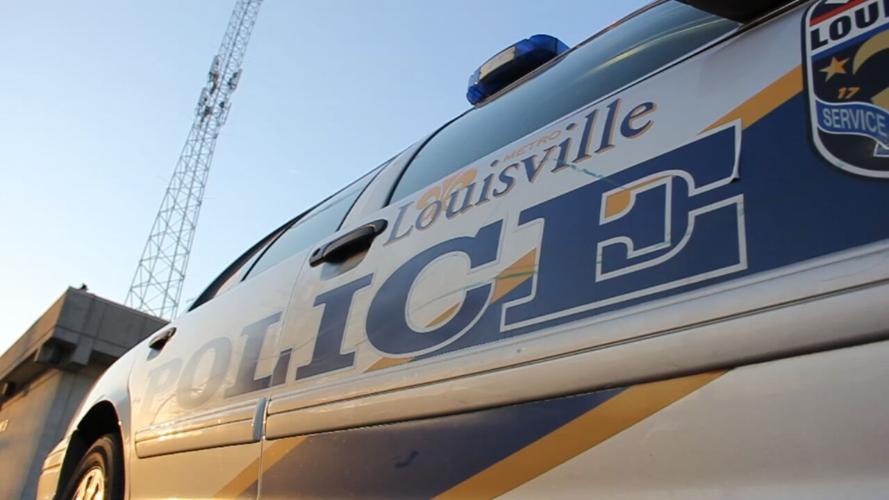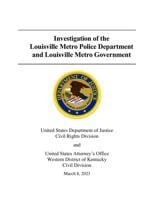LOUISVILLE, Ky. (WDRB) -- The federal investigation into the Louisville Metro Police Department cites 63 different incidents of alleged misconduct.
That's according to an appendix of a 90-page report the U.S. Department of Justice released earlier this month following their roughly two-year investigation into LMPD.
The DOJ calls the appendix just a portion of the evidence uncovered through their investigation. It doesn't provide specific details from the report, but does provide case numbers and citation numbers, revealing how the DOJ is building their case, which includes 14 instances of excessive force by LMPD.
Examples of excessive force provided in the first section of the appendix include the use of neck restraints and police dogs against "people who pose no threat," an "unreasonable and unsafe" use of tasers, using takedowns, strikes and bodily force "disproportionate to threat or resistance," and escalating encounters, leading to excessive force.
The investigation was launched in the wake of the 2020 police killing of Breonna Taylor.
Her death sparked months of protests in downtown Louisville that summer. The DOJ report cites three specific incidents where police violated First Amendment rights during the protests.
One of those incidents involves an officer who struck a protester in the back of the head with a riot stick after the person had dropped to their knees and raised their hands.
That officer, Cory Evans, pleaded guilty to federal charges in August 2021. Evans was also cited in the DOJ report as an example of the department's deficient accountability system that resulted in repeated misconduct as he had already faced nine different investigations before his resignation in 2021.
He was sentenced to two years in prison, two years of supervised probation and nearly $2,000 in restitution after admitting to hitting the person in the head with the baton.
The DOJ said LMPD violates the First Amendment when "responding to protected speech against police action" where 2020 protesters challenged police verbally and outside of the 2020 protests.
The report also listed 10 different instances in the section focused on LMPD unlawfully discriminating against Black people, including detectives who threw drinks at people while on duty in west Louisville. Former officers Bryan Andrew Wilson and Curt Flynn later pleaded guilty to civil rights violations.
The DOJ said LMPD and Metro Louisville "knew about discriminatory policing and adopted practices that increased the risk of discrimination" and "failed to respond appropriately to officers who express explicit racial bias."
A section of the appendix covers LMPD violations of the Americans with Disabilities Act "in their response to people with behavioral health disabilities." There are nine such instances covered in that section.
Another section raises concerns about the department's response to sexual assault and domestic violence, saying it "doesn't investigate officers accused" and "doesn't adequately respond to or investigate these crimes."
A section of the report focused on problematic warrants, such as the one that federal prosecutors say sent officers to Breonna Taylor's home. The DOJ's report cited six other examples where LMPD conducted searches based on invalid warrants.
In September 2020, WDRB reported that Louisville police were repeatedly told there were no packages, "suspicious or otherwise," delivered to Taylor's home in connection to a drug investigation, citing testimony in an internal LMPD report. That ran counter to information a police detective provided to a judge who approved the warrant for Taylor's apartment, where officers shot and killed her during an early-morning raid on March 13, 2020. Police believed a drug suspect, Jamarcus Glover, was getting packages at her apartment on Springfield Drive near Pleasure Ridge Park.
On March 12, a day before the raid on Taylor's Springfield Drive unit, a warrant affidavit written by Detective Joshua Jaynes said he had “verified through a US Postal Inspector that Jamarcus Glover has been receiving packages” at Taylor’s home.
Police cited that claim as a justification for seeking out a warrant that allowed officers to enter her home as part of a broader narcotics investigation into Glover and an associate.
Additionally, the DOJ said, LMPD "executes search warrants without knocking and announcing."
A major focus of the Taylor case involved a "no-knock" warrant police used for the raid on her apartment.
LMPD claimed that while an officer obtained a "no-knock" warrant, police repeatedly knocked on Taylor's door and announced themselves before knocking it in. But Taylor's boyfriend, Kenneth Walker, has maintained he never heard police announce themselves and believed the couple was being robbed. He fired a shot, hitting former officer Jonathan Mattingly in the leg.
Police responded with 32 shots, hitting Taylor six times. The 26-year-old died at the scene. No drugs were found in her home.
That led to the city of Louisville passing "Breonna's Law," which banned the use of no-knock warrants in the city. No-knock warrants were also restricted statewide after Gov. Andy Beshear signed a bill limiting their use in April 2021.
"This conduct is unacceptable. It's heartbreaking, it violates the public's trust," U.S. Attorney General Merrick Garland said when announcing the findings of the DOJ investigation in Louisville earlier this month.
Louisville Mayor Craig Greenberg, nearing his fourth month as the city's new mayor, promises to try and correct these mistakes and heal the wounds created in the community.
His office released the following statement along with the release of the appendix Thursday:
"We have just received this information from the Department of Justice and are beginning our review of the referenced documents, files, and body camera footage to identify all the details of the incidents referenced in the findings report. When that review has been completed, we will release details of each incident and supporting documents."
Copyright 2023 WDRB Media. All Rights Reserved.




























